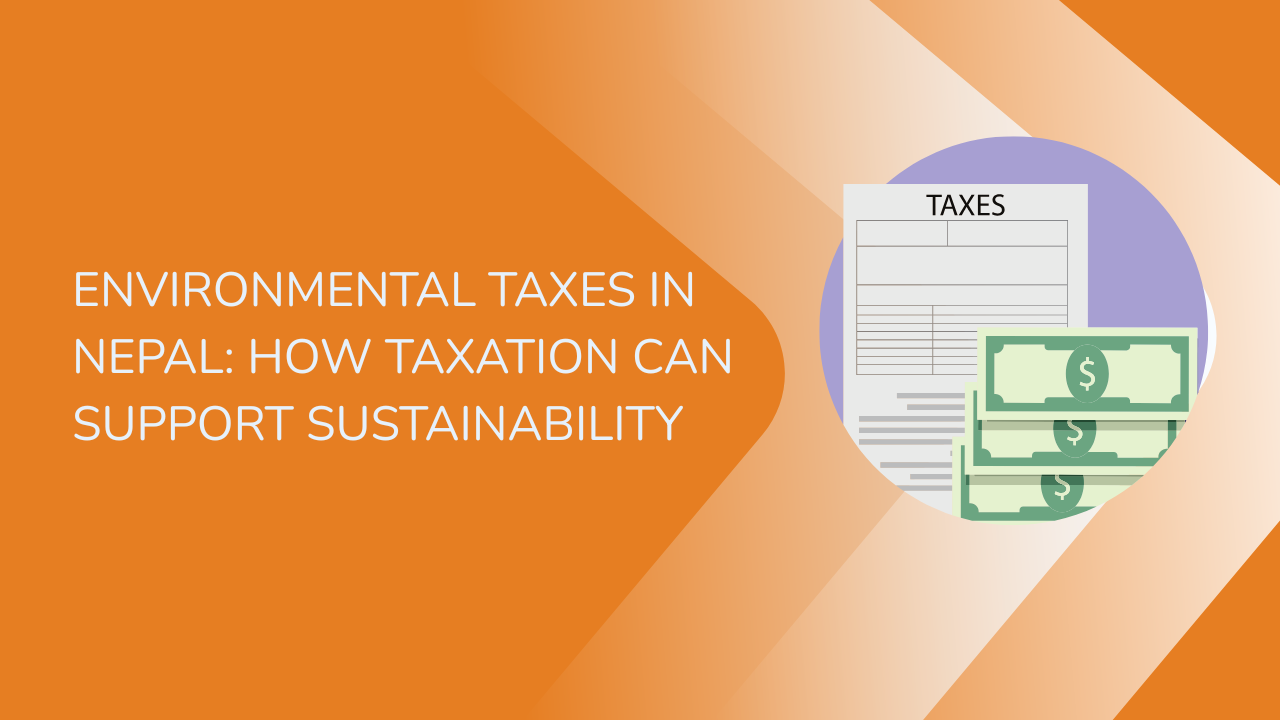Share this Article
Navigating the corporate tax environment is a critical aspect of managing a business. In Nepal, corporate taxation is governed by the Income Tax Act, 2002 and various regulations that shape how businesses are taxed. A firm grasp of the corporate tax system is essential for businesses to comply with legal requirements, optimize tax liabilities, and leverage available incentives. Whether a business is just starting or is already established, a clear understanding of Nepal’s corporate tax system can significantly affect financial health and operational success.
In this article, we will break down the corporate taxation system in Nepal, providing a detailed explanation of tax rates, regulations, tax exemptions, deductions, and other vital aspects of taxation for businesses. This guide aims to provide business owners, entrepreneurs, and financial professionals with a clearer picture of corporate taxes, enabling them to make informed decisions that contribute to their success.
1. Overview of Corporate Taxation in Nepal
Corporate taxation in Nepal is primarily governed by the Income Tax Act, 2002, which serves as the legal framework for all taxation activities, including income tax, corporate tax, and VAT (Value Added Tax). This Act, along with other fiscal regulations and amendments, determines how companies in Nepal are taxed based on their structure, activities, and profits. Understanding the core aspects of the taxation system is crucial for businesses to avoid any legal issues and ensure that they remain compliant with national tax laws.
The Nepalese tax system classifies businesses into two major categories based on residency: resident companies and non-resident companies.
Resident Companies
A resident company is one that is incorporated under Nepalese law and has its management or place of control within the country. A resident company is subject to income tax on its worldwide income, meaning it must pay taxes on profits generated both within Nepal and abroad.
Non-Resident Companies
A non-resident company, on the other hand, is a foreign company that does not have a permanent establishment in Nepal. Non-resident companies are only taxed on income generated within Nepal, meaning that any revenue earned outside the country is exempt from Nepalese taxes.
Understanding the distinction between these two categories is crucial for tax planning because the taxes applicable to each differ significantly.
2. Corporate Tax Rates in Nepal
One of the key elements of corporate taxation in Nepal is the corporate tax rate. This rate varies based on the business type, industry sector, and size of the company. The corporate tax rates are structured to encourage certain sectors while imposing higher taxes on others. Let’s look at the different tax rates that apply to businesses in Nepal.
General Corporate Tax Rate
For most businesses operating in Nepal, the standard corporate tax rate is 25%. This rate applies to the profits of most companies, including those in the service, manufacturing, and trading sectors. Small businesses or startups might qualify for tax exemptions or reductions under specific schemes, but the majority of businesses fall under this standard rate.
Reduced Tax Rates for Specific Sectors
Nepal's tax system is designed to promote specific sectors that are considered vital for the country's economic development. As such, several industries benefit from reduced tax rates or exemptions. For example:
- Manufacturing Sector: Businesses that are involved in manufacturing generally pay a lower corporate tax rate of 20%. This reduction in tax rates is meant to foster industrial growth, boost production capacity, and stimulate economic activity.
- Export-Oriented Industries: Export-oriented businesses enjoy tax benefits to encourage Nepal’s integration into the global market. Income derived from exporting goods and services can be exempt from taxation. This provides a financial incentive for businesses to focus on international markets and contributes to enhancing Nepal’s foreign exchange reserves.
- Information Technology (IT) and Software Development: Companies in the IT and software development sector may qualify for tax exemptions or reductions. This tax relief is part of the government’s effort to position Nepal as a technology hub and encourage innovation in the digital economy.
- Hydropower Sector: Hydropower is another priority sector for Nepal’s development. Due to the country’s vast natural resources, companies involved in hydropower projects benefit from tax holidays or exemptions for a fixed number of years to encourage investments in renewable energy.
Corporate Tax Rates for Large-Scale Enterprises
Large-scale enterprises, particularly those with substantial revenue or those in the banking and insurance industries, face a higher tax rate. Corporations with significant capital and profits are generally taxed at a 30% rate. This higher tax rate reflects the larger scale of operations and profitability of such businesses.
3. Taxation on Dividends, Capital Gains, and Other Income
In addition to income from business operations, there are other forms of income that are taxed separately, including dividends, capital gains, and interest income. Understanding the taxation of these income types is crucial for businesses as they may affect their overall tax liabilities.
Dividend Tax
Dividends, or profit distributions, paid by a corporation to its shareholders are subject to 5% withholding tax. This tax is deducted at the source before the dividend is paid out. It ensures that the government collects its due share of tax on profit distributions, even if the shareholders are foreign entities.
Capital Gains Tax
Companies that sell capital assets, such as shares, properties, or other investments, are liable to pay taxes on the profits they make from these sales. The capital gains tax rate varies depending on the nature of the asset:
- 15% tax applies to gains from the sale of shares.
- 10% tax applies to profits from the sale of real estate.
Capital gains taxes are an important consideration for companies involved in the buying and selling of assets. It’s essential to track the timing and holding period of assets to understand how these tax rates apply.
Tax on Interest Income
For businesses that earn interest on loans or investments, this income is also subject to taxation. The standard tax rate on interest income is 10%. This applies to interest paid on loans taken for business purposes as well as interest earned from bank deposits or other financial instruments.
4. Deductions and Allowances for Businesses in Nepal
Nepal’s tax system allows businesses to reduce their taxable income by claiming certain deductions and allowances. These deductions help minimize the overall tax liability for businesses and encourage investment in assets, employees, and innovation. Below are some of the key deductions available to businesses:
Depreciation on Capital Assets
Businesses in Nepal can deduct depreciation on capital assets over time. Depreciation allows businesses to spread the cost of capital assets like machinery, vehicles, and buildings over their useful life. The specific depreciation rates are determined by the government and vary depending on the type of asset.
- Machinery and Equipment: These assets typically have a higher depreciation rate, meaning businesses can deduct a larger portion of their cost each year.
- Vehicles: Vehicles are generally depreciated at a specific rate, allowing businesses to deduct part of the cost every year.
Depreciation reduces taxable income, thus lowering the amount of tax a company needs to pay.
Business Expenses
Business-related expenses are another area where companies can claim deductions. These expenses must be necessary and ordinary for the business’s operations. Common deductible expenses include:
- Salaries and Wages: Payments made to employees are fully deductible.
- Rent and Utilities: Business premises rent, utility bills, and other similar operational expenses can be deducted.
- Marketing and Advertising: Expenses related to promoting the business or its products, such as advertising and branding costs, are deductible.
Maintaining detailed records and documentation for these expenses is essential to substantiate claims during tax assessments.
Interest Payments
Businesses that take out loans for operations or investments can deduct the interest payments made on these loans. This deduction is significant for businesses that rely on financing, as it reduces the overall taxable income.
Research and Development (R&D) Expenses
Companies investing in innovation and technological development may qualify for deductions on their R&D expenses. This encourages businesses to invest in improving their products and services and enhances technological growth in the country.
Loss Carryforward
If a business incurs a loss in one fiscal year, it can carry forward that loss to offset taxable income in future years. In Nepal, businesses can carry forward losses for up to five years. This provision helps businesses cope with fluctuations in revenue and reduces tax burdens in subsequent profitable years.
5. VAT and Other Indirect Taxes
In addition to corporate income tax, businesses in Nepal are also subject to Value Added Tax (VAT), an indirect tax on goods and services. Businesses must register for VAT if their turnover exceeds a certain threshold, and they are required to collect VAT from customers and remit it to the government.
The standard VAT rate in Nepal is 13%. Businesses collect VAT on sales (output VAT) and can claim back VAT paid on business-related purchases (input VAT). By doing so, businesses only pay tax on the value added to the goods or services at each stage of production or distribution.
Other Indirect Taxes
In addition to VAT, businesses might also encounter other indirect taxes, including:
- Customs Duties: These taxes apply to goods imported into Nepal. The rates vary depending on the product being imported.
- Excise Duties: Excise duties are imposed on certain goods, such as alcohol, tobacco, and petroleum products.
Managing VAT and indirect taxes is critical for businesses, especially those involved in importing or manufacturing, as it can directly affect cash flow and pricing strategies.
6. Tax Filing and Compliance Requirements
Every business in Nepal is required to comply with tax filing and reporting obligations. Failure to meet these requirements can result in penalties, fines, and interest charges. Businesses must submit various returns to the tax authorities:
Income Tax Returns
Corporations must file annual income tax returns that detail their revenue, expenses, profits, and tax liabilities. The deadline for submitting these returns is typically four months after the end of the fiscal year. Timely filing of returns is essential to avoid late fees and penalties.
Quarterly VAT Filings
Businesses that are VAT-registered must file VAT returns on a quarterly basis. These filings report the VAT collected from customers and the VAT paid on purchases. Companies need to ensure they file these returns accurately and on time.
Audit Requirements
Businesses with a certain level of turnover are required to undergo audits. These audits verify that businesses comply with tax laws and accurately report their financial activities. Audits provide an additional layer of assurance that businesses are following regulations and paying the correct amount of tax.
7. Tax Planning Strategies for Corporations
Tax planning is an essential process for businesses to minimize tax liabilities and enhance financial outcomes. Some key strategies for effective tax planning include:
Choosing the Right Business Structure
Selecting the correct business structure—whether a sole proprietorship, partnership, LLC, or corporation—can have a significant impact on tax liabilities. Incorporating a business as a corporation or LLC offers advantages such as limited liability and the potential for tax deductions and exemptions.
Leverage Tax Incentives
Certain sectors, such as manufacturing, IT, and hydropower, benefit from tax incentives. Business owners should ensure they take full advantage of these incentives to reduce their tax burden. This may include applying for tax holidays or reduced rates.
Maximize Deductions
Careful record-keeping of business expenses allows companies to claim deductions for salaries, rent, utilities, and other necessary costs. This reduces taxable income and lowers the overall tax liability.
Consider Loss Carryforward
Companies that face financial setbacks can utilize loss carryforward provisions to offset future taxable income. This reduces the tax burden in profitable years following a loss.
8. Conclusion
Corporate taxation in Nepal is governed by complex laws and regulations, which businesses must understand to navigate successfully. By staying informed about the tax rates, laws, deductions, and filing requirements, businesses can minimize their tax liabilities, comply with legal obligations, and optimize their financial performance. Whether you are a small business, an international corporation, or an entrepreneur, effective tax planning can help ensure your business’s long-term growth and sustainability in Nepal’s competitive market.
Categories:
Tax Information
Tags:
local businesses
,
strong brand
,
strategies
,
BusinessTaxesNepal
,
NepalLegalGuide
,
E-commerce







